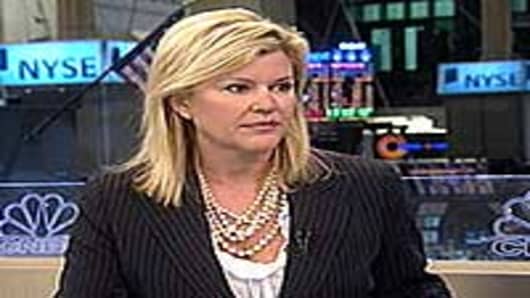The furor marks a departure from the usual fawning over the camera-friendly Whitney, whose legendary call on Citigroup’s woes was—at the time—an unappreciated canary in the financial services coal mine that foretold the worst crisis since the Great Depression.
In the months since she made the muni call—first on CNBC, then on “60 Minutes”—Whitney has been like a clown sitting on the dunk tank at the county fair, just waiting for one analyst after another to throw hardballs at the bull’s-eye to drop her into the drink.
It was startling, then, that no less a figure than Jim Chanos, the high-profile hedge fund manager at Kynikos Associates went to bat for Whitney during a Thursday appearance on CNBC.
In brief remarks, Chanos said Whitney’s call “in a general sense” was correct.
That feeling that she is basically correct that municipals are not a great investment now reflects the Whitney zeitgeist, in which she gets the general direction right but usually overshoots in diagnosing the depth of the problem.
Going back over the past couple of years, Whitney was sort of right that unemployment was going to go to 13 percent—it never quite got there though it did move up substantially from when she made the call.
She was sort of right when she said last April that Goldman Sachswas going to trade down to book value—the stock did drop but was a good shot away from hitting the $120 level that would have made her prediction correct.
So she is likely to be sort of right again—munis are in for a spate of defaults, but her estimate that more than a hundred governments could do so and cost hundreds of billions of dollars is probably just another round of over-the-top mugging for the cameras.
As such, she has been pilloried, in more polite terms by Bill Gross at Pimco and in a bit more hostile fashion elsewhere, and may well have her professional reputation at stake should the call go awry. David Kotok of Cumberland Advisors has accused Whitney of being “Chicken Little” and using “innuendo and assertions and hype.” Dick Larkin, at Herbert J. Sims, says Whitney continues “to spread misinformation” about a default problem that won’t exceed $20 billion, a sliver of the total muni market.
But make no mistake, Whitney is still a popular and respected analyst, at least gauging by my inbox.
“I support Ms. Whitney in making her comment based upon the current business world environment,” said one e-mailer named Rob. “The markets will have to digest and plan for this possibility. I hope those who speak against this possibility are not thinking with their wallets, but with their great minds. We need solutions, not more drama.”
That’s a sentiment expressed repeatedly in the comments section of a story I posted yesterday on Chanos’ remarks. Word on the street is that something is amiss with munis, even if it doesn’t turn into the quasi-Armageddon scenario Whitney espouses.
The main reason Whitney is likely to be sort of wrong—in that Meredith Whitney kind of way—is that despite the air of fiscal frugality prevailing in Washington, it’s hard to imagine President Obama and Fed Chairman Ben Bernanke standing idly by while bond holders get crushed by a wave of muni defaults.
In Bailout Nation (apologies to Barry Ritholtz), the authorities will step in and step in aggressively if needed to make sure a raft of bailouts doesn’t cripple local economies. That’s not to say that bondholders won’t take a substantial haircut, because they will, but it does say here that actual defaults will give way to the more polite “restructuring” that at least will preserve some capital even as rates surge ever higher.
In fact, this will be one of the ingredients that will accelerate inflation in the years ahead, as governments domestic and abroad are forced to restructure. (In my forthcoming book with Peter J. Tanous, “Debt, Deficits and the Demise of the American Economy,” to be released by Wiley in two months, we lay out just such a scenario.)
For Whitney, that will mean that her call regarding trouble for munis will be right, sort of—in just that Meredith Whitney kind of way.
_________________________________________
Questions? Comments? Email us at NetNet@cnbc.com
Follow Jeff @ twitter.com/JeffCoxCNBCcom
Follow NetNet on Twitter @ twitter.com/CNBCnetnet
Facebook us @ www.facebook.com/NetNetCNBC



